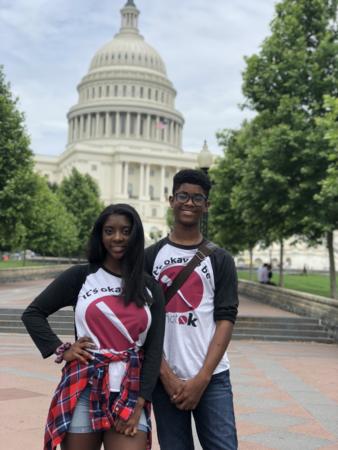Hannah Lucas, a 16-year-old high school student from Cummings, Georgia, has overcome a lot. At 15-years-old, she was diagnosed with Postural Orthostatic Tachycardia Syndrome (POTS), a chronic illness that causes one to faint. Her symptoms started between the ages of 12 and 13.
“When I was in ninth grade, I started passing out. Basically, it just means that I have very low blood volume and low blood pressure,” she said. “I was passing out so often, kids started bullying me, I was getting sexually harassed and even being threatened.”
Her illness — and the ridicule from her classmates that followed — took a toll on the teen, leading to anxiety, depression and an eating disorder. She says her condition caused her to miss about 200 classes during her freshman year of high school.
To deal with her pain, she started to self-harm and later attempted suicide when her mother came into her room, held her and stopped Hannah before tragedy struck.
“If my mom didn’t come to my room that night, I wouldn’t be here,” Hannah said.
Mental health in the Black community is often swept under the rug or remedied with ineffective treatments. Consequently, suicide rates among Black youth have increased greatly over the past several years.
A 2015 study showed that suicides rates among Black children ages 5 to 11 almost doubled between 1993 and 2013.
A separate study from the Suicide Prevention Resource Center, shows suicide is the third leading cause of death of Blacks from ages 15 to 24 and the 16th leading cause of death among Blacks of all ages.
For Lucas, her battle with bullying and depression could not be ignored, and she wanted to make sure others addressed their own struggles with mental health. She and her 13-year-old brother, Charlie Lucas— who also dealt with anxiety and panic attacks— used their own experiences as a call to action to help others who may be dealing with the same issues as them.
The pair of siblings built notOK, an app that acts as an s.o.s for those who need help. Users select contacts they can trust to serve as their own digital support system. At the push of a button, the app will get users immediate support via text, phone call, or it will send out a GPS location to your “trusted contacts.” If no one contacts them within 8- 10 minutes, someone from a crisis helpline will call to ask if they are ok.

Charlie — who has been coding and programming since age seven — built the app’s basic premise, developed the best workflow, and within nine months the app was fully functional.
Charlie and Hannah spent last summer in the library researching mental health. They also took coding and programming classes at local colleges to learn how to make the app more accessible.
“We created the app because we needed it, but the more research we did the more we found out how many people needed it,” Hannah told Parade. “One in five kids have depression, and that’s just the kids who have talked about it or asked for help.”
Black teens deal with the daily realities of police brutality, racism and systematic oppression in addition to other everyday problems. The stigma around mental health in the Black community can prevent those seeking help to receive it.
“People hear ‘anxiety’ and ‘depression,’ they are told medical diagnoses, they see white people on the internet sharing their stories of battling mental health — and they think ‘Oh, that’s not me,’” said social worker and founder of the Respect Your Struggle project Jessmina Archbold.
Hannah says sharing her story has encouraged other teens dealing with depression and other mental health issues to seek help.
Slowly, the app has gained popularity nationwide. The siblings’ story has gained the attention of several national mental health organizations and news outlets.
The app, which launched in January, has been downloaded 50,000 times with plans for future updates to connect users with other hotlines and resources. Charlie and Hannah have also gotten endorsements from Mental Health America, Born This Way Foundation and the American Association of Suicidology. They recently received the Mental Health America national mPower award.
Hannah nicknamed the app “my little phoenix” because “it was the beauty to come from her ashes.”
This piece originally published on December 4, 2018.

